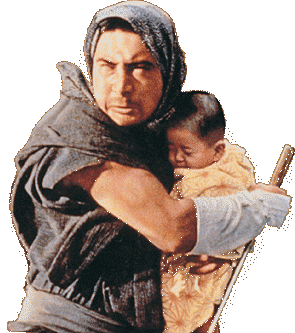



   |
 |
|
Zatoichi, the legendary blind swordsman, is back and better than ever in three more DVD releases from Home Vision Entertainment -- Zatoichi and the Chest of Gold (1964), Zatoichi's Flashing Sword (1964), and Fight, Zatoichi, Fight (1964). Beginning in 1962 with The Tale of Zatoichi, this highly regarded chambara series spawned over 26 sequels and a television series. Acclaimed actor and director "Beat" Takeshi Kitano (Violent Cop, Sonatine, Fireworks, Brother, Battle Royale) has even resurrected the character in a soon-to-be-released film.
Spanning three decades of mayhem, star Shintaro Katsu perfectly inhabited the role of the deadly blind ronin who wanders through Japan righting wrongs and leaving behind a lot of corpses in the process. Despite his lack of sight, Zatoichi has perfected his fighting skills by the use of his overly-sensitive hearing. He may look like an over-grown puppy dog, but Zatoichi's fighting skills are second to none. Technically employed as a masseur (a common occupation among blind people at the time since their handicap prevented them from holding higher caste jobs), Zatoichi earns much of his income from gambling. And when his fellow gamblers eventually decide to cheat him out of his earnings (which frequently happens), he wastes them.
Although the films occasionally get bogged down in routine melodrama, Shintaro Katsu is always engaging, likable, and a master at bringing something new to each installment. Just when you think he's about to phone in the performance, he reveals another facet of the character. In other words, just as Zatoichi's opponents make the deadly mistake of underestimating his prowess with a blade, it would be an unfortunate mistake indeed for the viewer to underestimate the power of this long-running series.
The opening credits sequence for Zatoichi and the Chest of Gold is almost worth the price of admission alone, so to speak. Standing alone upon a darkened stage, Zatoichi systematically cuts, slices, and disembowels his attackers as if they were nothing but automatons. The highly-stylized sequence is almost surreal in its hyperkinetic violence. Unfortunately, the rest of the film never soars to this frenetic height again. Nevertheless, it's still a solid entry in the series.
After a group of peasants are ambushed by a surly gang of bandits (led by a fabulously bizarre and sadistic bullwhip brandishing criminal) bent on stealing a chest of gold that the peasants were carrying to pay off their debt to the local warlord, Zatoichi is wrongly accused of stealing the treasure from the bandits. With the peasants -- who earlier in the film welcomed the blind swordsman with open arms -- angry with him on one side and the real gangsters out to kill him, Zatoichi finds himself in a mess more serpentine than usual. With swift action and a gripping storyline, Chest of Gold is without a doubt an excellent installment.
Perhaps winded by the previous film, Zatoichi's Flashing Sword takes a while to really let loose. In fact, it's almost 45 minutes before Zatoichi finally gets to unleash his fury upon a group of daft gangsters (underwater no less). But when the bloodshed really erupts during the long, messy climax, Flashing Sword rewards viewers' patience with one of the most memorably over-the-top finales that the series has produced thus far. The story leading up to the carnage -- Zatoichi finds himself the center of contention between two rival crime bosses -- is sadly indifferent at best. Except for some interesting moments dealing with class distinctions, too much of the storyline simply seems reminiscent of earlier and better episodes. Luckily, Shintaro Katsu's performance is excellent as usual as he allows the character's more humorous side to come out.
For the eighth film in the series, the mood drastically shifts from the more cartoonish atmosphere of the last two films to something more melancholic and somber, reminiscent of some of the earliest of the films. After a woman is brutally slain by a group of assassins, the woman's baby is entrusted into Zatoichi's care. Bent on delivering the child to its' maternal father, who lives in a far away village, the blind swordsman fights towards his destination with baby at his side. But as fate would have it, Zatoichi's hope that the father of the child would gladly accept the return of his offspring with open arms does not go smoothly. Fight, Zatoichi, Fight is more than a worthy addition to the series and a welcome return to the more sober aspects that the last couple of films relinquished in lieu of more extravagant bloodletting and bold action.
All three discs are presented in their widescreen (2.35:1 enhanced aspect ratios) glory and are equipped with easy-to-read English subtitles. Informative liner notes are included, and most importantly, each disc comes with a very nice mini-movie poster replication from the series, perfectly fit for hanging up on the walls. A great souvenir to say the least.
Zatoichi and the Chest of Gold, Zatoichi's Flashing Sword, and Fight, Zatoichi, Fight are now available on DVD from Home Vision Entertainment. Each disc includes a small stills gallery and an essay about the Zatoichi series. Suggested retail price: $19.95 each. For more information, check out the Home Vision Entertainment Web site.
|
|